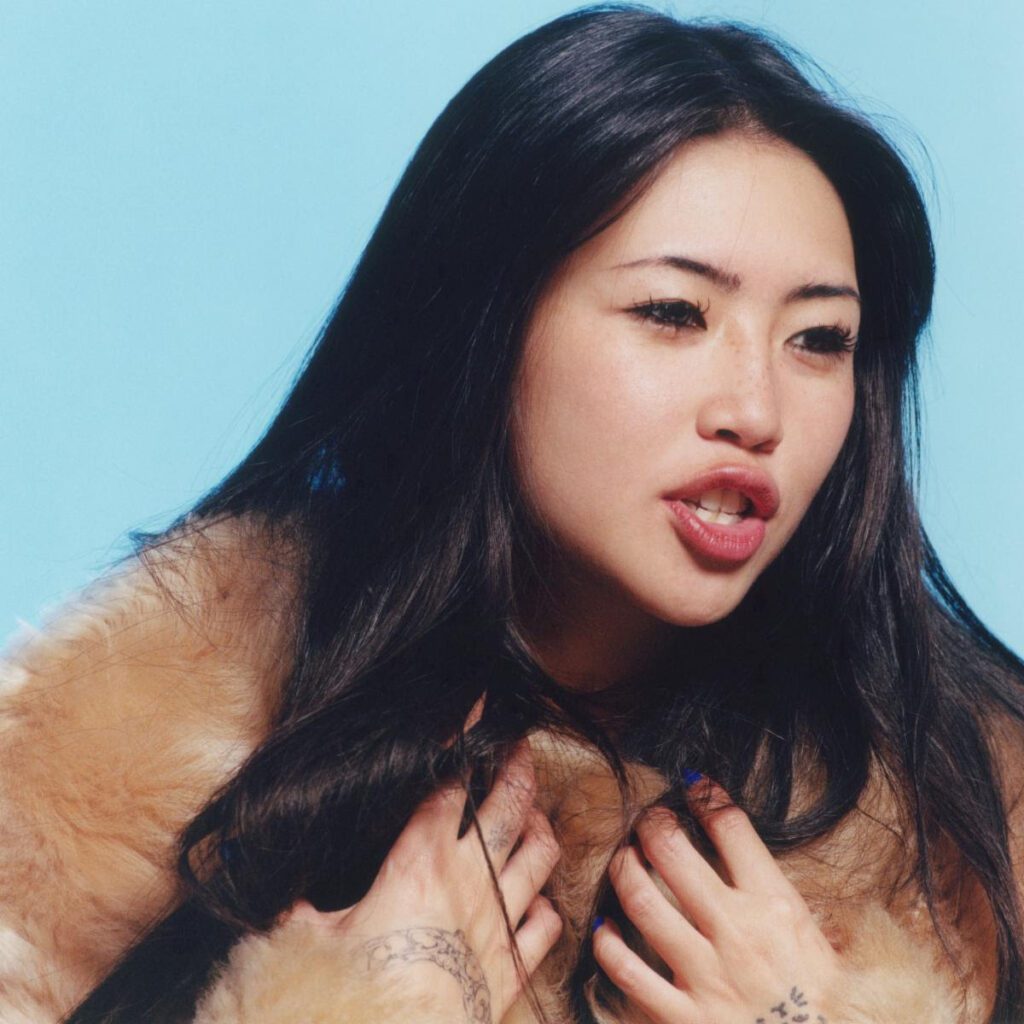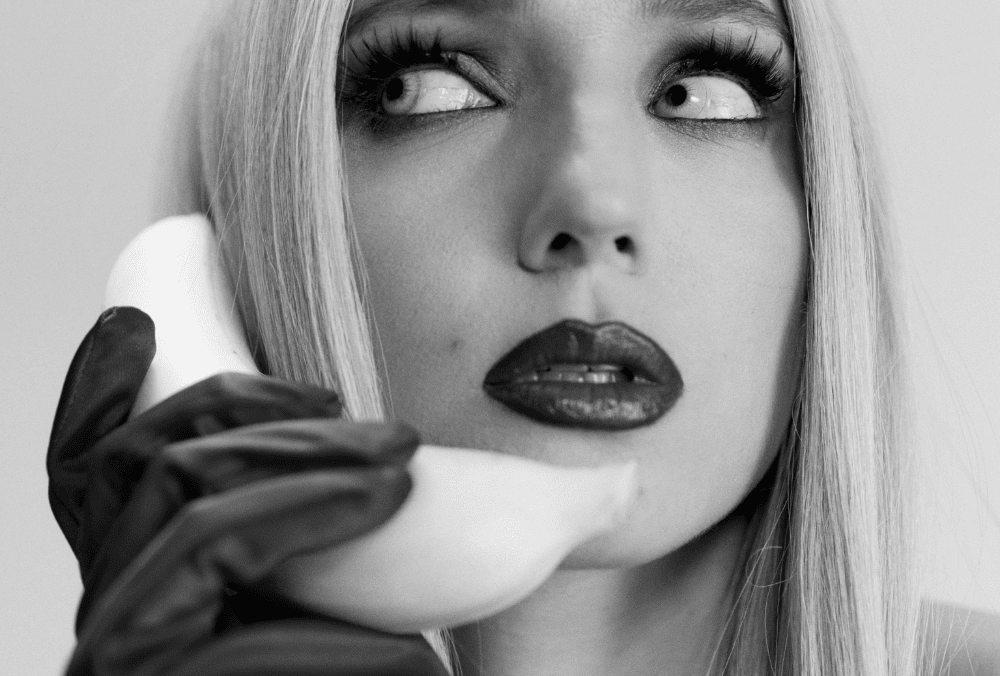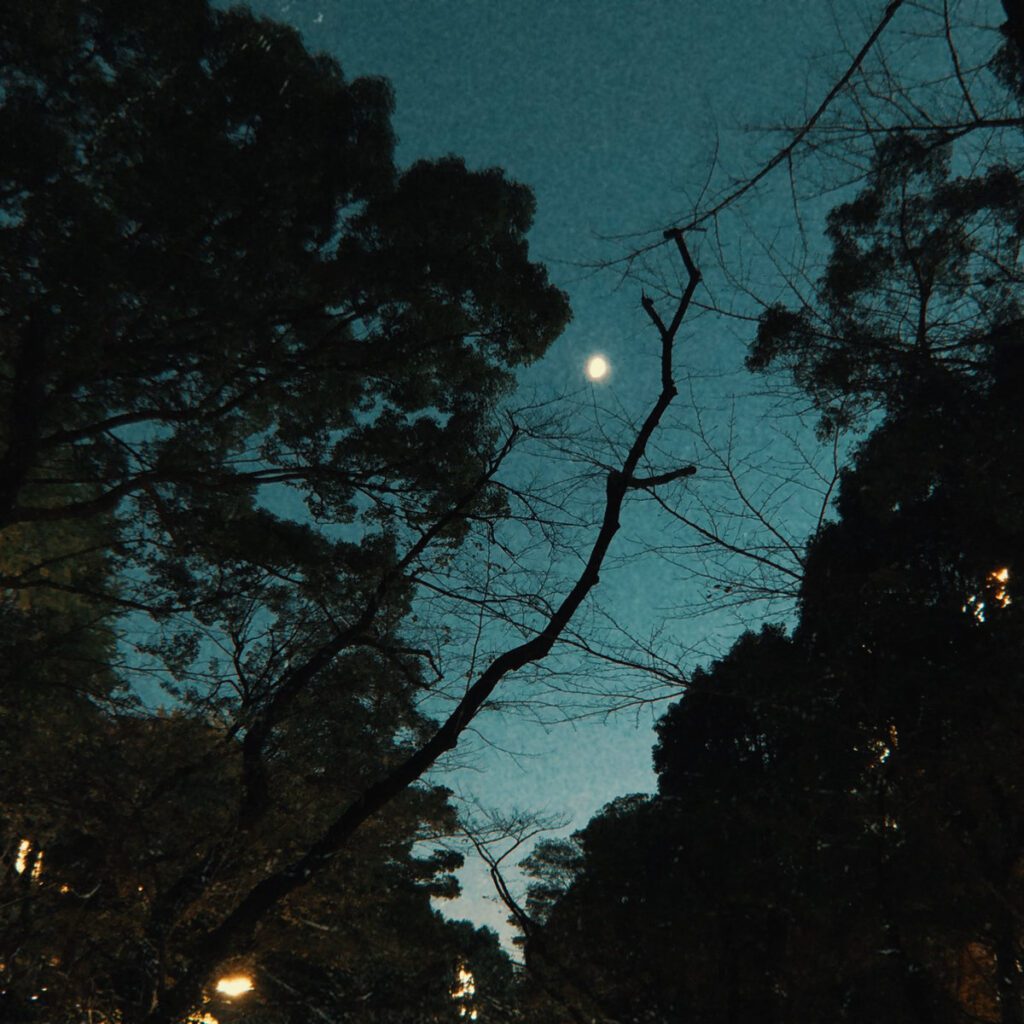
4. “Real Man”
I love this one. There’s this really fun bluesy feel to it. How did that feel to write?
LAUS: I just wanted to write, like, a sexy song. Like I wanted to write a cheeky, flirtatious song. And the whole idea of it is just finding men constantly disappointing. I think that’s a very relatable feeling a lot of people have. So I tried making the sound of it and the melody of it match the vibe of what I was singing about. But it was very inspired by a Lana Del Rey song that is unreleased called “Wayamaya.” I remember I found that song on YouTube years and years ago, and I rediscovered it again when I was writing this record, and I was like, oh my god, I want a sort of bluesy, sexy song. So that’s how “Real Man” was born.
This is more of a general question, but I know that Rick Rubin had you play your demos to him on an acoustic guitar rather than playing him a recorded demo. Were there any songs where through that process you were like, ‘Actually, this works well in this stripped-back capacity and it doesn’t need more stuff on it’?
LAUS: Definitely “Everything I Want.” And even “Coming Home” and “Real Man,” all those songs. All those songs that stayed acoustic on the actual record. We had ideas for it, but once we had played it and once we had A/B-ed it with the demos me and Jacob had made in London, and when we listened to it back with Rick, we realized that maybe stripping it back was the better idea.
5. “Tie My Shoes”
LAUS: “Tie My Shoes,” I think it’s me trying to come to terms about childhood trauma and about having issues, and how that affects my relationships today. But the premise of just not knowing how to tie my shoes, I genuinely do not know how to tie my shoes. And every person I’ve been with, I have gotten them to tie my shoes. So I tried looking in a deeper sense, through therapy, through growing up, just trying to figure out why I needed [that] so badly, and I think I missed out on a lot of that when I was a kid. So it’s, I think, one of the saddest moments on the record.
There’s these amazing horns going on in the background. How did those come into the song?
LAUS: Well, honestly, Jacob had so many ideas for this song. And what I liked about Rick is he still prioritized the meaning and the lyrics, and he still put them in the forefront, despite all this beautiful instrumentation that Jacob had ideas for. And I think it just suited the song so much. It’s a very emotional song, and I feel like the saxophone just is such an emotive instrument.
6. “Girl Song”
This is a song where you sing about insecurities and self-esteem and body image. Why did you feel like you needed to write this song?
LAUS: It’s funny you ask that. So I wrote it in this house again, this is another song I wrote at home. And I didn’t realize, I think, I was coming onto my period. But I was just really, really sad one day, and I had one spot on my face, and I felt like the world was tumbling down at my feet. So the words just came really naturally. I got really inspired by Simon & Garfunkel and the Beatles — true songwriters, and how they structure a song and their melodies. So I tried referencing that in this song. But really it was the lyrics that kind of brought this song to life and made it a thing. I feel like I write my favorite songs when I feel a very strong emotion, whether it’s feeling really, really happy or really, really sad, and I just felt really down that day.
It feels really cool to have just a straight-up piano ballad in the middle of the album. Did that feel like a bold move to you?
LAUS: Yeah. I think just writing a piano ballad in general was a bold move, and it was actually meant to be a single, but I was scared about it. Because it was so different to what I had made, and I just thought, I think it’s more special when people find it on the record. But yeah, I actually originally wrote it on guitar, I can’t play piano. So I played it to an amazing piano player, his name is Benny [Bock]; I just played him the song on guitar and he just immediately took it up on piano. We didn’t know whether we wanted a piano song, but then when we heard the chords transcribed on piano chords, I was like, this has to be a ballad, this has to be a piano song.
7. “Coming Home”
I love the waltzy feeling going on. What inspired that?
LAUS: Well, I wrote it in LA, so I guess there was a La La Land-esque [feeling] to it, and that romanticness to it. And I also missed my boyfriend and my cats a shit-ton. It was just after the Taylor tour, but then I had to stay a week extra in America because there was no point of flying all the way back home to London, so that meant I was away from home a little bit longer. And I just remember being really sad in my hotel room, and I remember I wrote a lot of songs in that hotel room. I was just on a complete roll, I think I just felt very inspired because I was so sad. But a song like [2023 standalone single] “Glue Song” I think opened my eyes to that realm of music, so writing “Coming Home,” it felt quite natural to me.
The song’s about yearning for this domesticity that you don’t get to have a lot when you’re a touring artist. How has you relationship with that idea of domesticity developed as you’ve gotten older?
LAUS: Well, I definitely tend to romanticize it a lot more when I’m away from it. I think there’s a beauty in mundane things, especially when life is so fast for a musician. I tend to just think about like, washing the dishes when I’m on tour, and I’m like man, I haven’t washed any dishes or swept the floor or cleaned, because I’m on a tour bus where the bus driver cleans it every night. So I tend to romanticize that a lot, and I find it really fun talking about those things in music because they’re not stereotypically beautiful things, they’re just the mundane and boring bits of life that I really crave.
8. “Ever Seen”
LAUS: I actually found the chords when I was on tour with Taylor, and I realized, wow, I never really take notice of hooks. The hooks just come naturally to me, but what if I really think about this when I write a song? So I had the hook of like, ‘The prettiest eyes I’ve ever seen,’ and I would play it over and over and over again. And I was struggling to find inspiration for the rest of the words in this song. I was definitely in love, but I wanted a song that was not just about romantic relationships. And then I went to Glastonbury and had an amazing time, but you know, when you’re getting fucked up absolutely every day you’re due a comedown. So I had the worst comedown of my entire life after Glastonbury. [Laughs] And I actually wrote this song with my boyfriend, and it was actually really therapeutic. Hence the lyrics like, ‘I swear it’s just the comedown that made me do it,’ and all the lyrics just kind of insinuating that I can be a bitch sometimes and it’s because I get too fucked up a lot, but I still love you and you have the prettiest eyes I’ve ever seen. And then also in terms of writing it whilst I was doing the Taylor tour and thinking about that Taylor tour, I thought about how she was obsessed with bridges, and I never really thought about bridges. So I was like, I really want the bridge to transform the song or just go to a completely different world. So I think that’s how “Everseen” was truly shaped.
It’s cool that you mention the Taylor tour, ’cause I definitely got a Taylor Swift vibe listening to this song. Does that happen a lot, where the artist you’re touring with seeps in as inspiration?
LAUS: Oh yeah, definitely. [Especially] someone as respectable as Taylor, 100%. And I had so many different plans for this song. It was meant to be a country song. ‘Cause she played “Begin Again” and I was like, oh my god, I wanna try and write a song like “Begin Again” — that’s my favorite Taylor Swift song. So “Everseen” was meant to be a country song, but then it soon became apparent that because the song was basically about drugs and about falling in love, it had to feel like you were kind of tripping on shrooms. So it’s almost like a nod to a song called “See You Soon” on Beatopia, but a much more upbeat version.
9. “A Cruel Affair”
There’s kind of a bossa nova thing happening here, which you’ve done before on “The Perfect Pair” from Beatopia. What draws you to that sound?
LAUS: I just love bossa nova. And I think after “The Perfect Pair,” I promised myself that every record I release, there has to be at least one bossa nova song. Just ’cause I find the melodies really fun. The guitar makes the melody, and the vocals can stay absolutely linear. I thought that what was perfect for me about this song was that I wanted to write a song about constantly comparing myself to every pretty girl on the internet, but I wanted to feel hot in doing so. And every time I listen to bossa nova in the summer I feel like a sexy bitch. [Laughs] So I was like, it’s only fair to write a bossa nova song about it. And at the end, there is a sense of hope where I’m like, “She’s a catch but so am I,” so what’s the point of being pissed off about it? So yeah, the album is deep as it is, and so serious, and I just wanted a fun little break from all the seriousness of it all.
10. “Post”
LAUS: So that’s one of the songs that I didn’t really take from personal experience. Maybe a little bit, but mostly inspired from things that I’ve heard other people go through when they go through breakups. And I just loved the idea of waiting for someone to send you a letter through the post, and trying to find out what they feel. But that’s why the chorus goes, “He said, he said…” but no explanation of what he said. Because he didn’t say anything. [Laughs] I wanted a rock song, I wanted a massive intro. I just had this vision of creating like a scene or something very visual, kind of painting a scene with music and words. Yeah, I love that song, that’s one of my favorite songs off the record.
11. “Beaches”
You mentioned before that this one is about being out in Malibu when you were making the album.
LAUS: I know I said “Post” is one of my favorites, [but] “Beaches” is by far my favorite. Like, top-tier, my favorite song I’ve ever written literally in my life. And I wrote it in Shangri-La, and it’s about Shangri-La, it’s about Rick, it’s about stepping into this opportunity and feeling unsure about it, but then doing it and finally feeling like I’ve made the best decision I’ve ever made. The idea of me kind of going into water, and what’s the point of just dipping your feet in when you could just go in full-force, is because when we were at Shangri-La, every time we had a break, we’d go to the beach. The beach was literally right outside our doorstep, like a two-minute walk. And we’d just jump in the sea — and bear in mind it was in the middle of November so it was freezing cold. But just jumping in that water just motivated everyone in that room so much more to go back and continue working up until like 1 a.m. So I tried using that analogy in the way I thought about going into Shangri-La and meeting Rick and doing this album with him and doing this album so far away from home. Because it was definitely a very daunting experience, but it definitely was the right decision.
It’s a big chorus, rockout kinda song. How fun are those for you and the band to do?
LAUS: Oh, we loved it. We recorded it live, my drummer was there and obviously Jacob was playing guitar, and I was playing acoustic guitar. And Jason [Larder] who played bass on most of the record was there – my [usual] bassist was back in London unfortunately, but [Larder] is an amazing bassist. And so we all played it live together. And it’s always really fun ’cause obviously there’s energy in the room when you’re playing it live, but you can feel the energy in the song as well. It’s something that you can’t really grasp when you record a song separately and in an organized way. When you’re doing it in a room all together it’s so much more fun. And in terms of the chords, I wanted a song like “Kiss Me” [by] Sixpence None The Richer. Really, really simple chords, a very happy-go-lucky song. And I think you can only make that sound if you do it live with everyone in the room with you.
12. “Everything I Want”
LAUS: I just wanted a plain old love song. I think my boyfriend deserved it. He’s the best. It’s honestly just how much I really, really love him, and how much I wanna try and do it right this time. ‘Cause even then I’m taking accountability in my own mistakes in past relationships. So there is that element where I’m like, I am trying to do it right this time because I love you so much. Norah Jones really inspired this track, I love Norah Jones, I grew up listening to her. And I really wanted like a tack piano, like I wanted a very honky-tonk sound. I wanted something that you could dance to and fall in love to, pretty much.
13. “The Man Who Left Too Soon”
LAUS: I wanted to write about death without having really experienced death in my family. I was like seven when my granddad and my uncle died, or even younger, so I can’t really remember or understand the feeling I had at the time. Apparently I was just confused that he was in the box, according to my mum. But now going out with someone who I love and who has experienced losing his father, I finally understood how that can really affect someone. So I wrote “The Man Who Left Too Soon” because I heard so many stories about Jake’s dad — Jake is my boyfriend — and he just sounds like the coolest dad ever. But what’s comforting to know is knowing that someone who’s passed will always be there, and they will always live on. It’s funny that there’s this notion of “At least we both look at the same moon.”
When I first wrote it, I was like, well, I had a dad that I guess messed up a couple of times, and I know Jake’s dad sounded absolutely wonderful, but then at the end of the day, I think people make mistakes because they only have one thing they’re referencing from and that’s their parents. So I tried understanding the mistakes I had made in relationships by looking at “the moon,” so my dad, and then my dad looking at the same moon with me and looking at his dad. But then later on I found out that before Jake’s dad passed, he drew a lot of moons. He drew a moon for every child he had. So when Jake played that song to his family — and I was so scared about showing him the song, ’cause I was like, is this stepping too far? I don’t know if this is appropriate — but they absolutely loved it. And they felt really emotional, because they were like, ‘It’s funny you’re singing that lyric, and I know maybe it means something different to you, but the last things he painted were moons.’ But yeah, I just wanted to write a song about that, and about dads basically.
I wanted to ask about your vocals on this one. You mentioned having that La La Land feel on a previous song. I definitely was getting that vibe, that kinda Old Hollywood thing. What were you influenced by vocally?
LAUS: Well, it’s very theatrical. There’s a lot of theatrical moments on the record, even on “This Is How It Went” and “Real Man” and “Coming Home”. I took a lot of reference from Elliott Smith. ‘Cause he tends to double his vocal track when he sings on a song. So we did that on all those songs, and especially on “The Man Who Left Too Soon.” And the vocal melody is quite tricky on that song to sing, so it took me a couple of tries, and also even the chord progression — I remember I wrote the chord progression back in LA, around the same time I wrote “Coming Home,” and it was quite hilarious because I couldn’t play the chord progression. I would play it and I’d sing it really badly, so I had to teach Jacob the chords to play on the album because I couldn’t play it myself. And then I sang over it.
14. “This Is How It Went”
There’s that waltzy feeling again. You mention Elliott Smith in the lyrics, who notably wrote a couple of waltzes. Was that an influence?
LAUS: Oh, yeah. He influences my writing [from] literally when I began to songwrite. I’ve got a tattoo of him. Yeah, I wouldn’t have picked up a guitar if it weren’t for Elliott. And there’s something about his music that comforts me, and so I wanted to write a song that comforted me. And I don’t know whether it would be relatable, it’s about a very specific situation and I only hope that people find it relatable enough. But writing that song really helped my brain just how listening to Elliott Smith would. I guess I never really thought about the waltz thing and how he did that a lot in his music, but it’s cool you say that, ’cause that wasn’t on purpose.
It’s a song where you talk about writing songs — this idea of like, ‘Look, I’m not trying to make you feel bad or anything, but this is what I need to do, is write these songs and get it out.’ Is that something you think about a lot when you’re putting personal songs out like this?
LAUS: Not necessarily, ’cause when I write songs I never think about the aftermath. I just think about like, oh my god, I love this song, I can’t wait to release it. And the people who listen to it would never relate it to a part of my life. People are quite selfish when they listen to music, so initially when they hear a song they’re always gonna think about how they’re gonna relate it to themselves. I mean, that’s what I do. It’s until the person who that song is about makes it [publicly] obvious it’s about them, that’s when it becomes tricky. And the entire meaning behind “This Is How It Went” is basically like, I was just expressing my feeling in art like how everyone does, except you sang along to the words, and that became quite a traumatic experience for me and for everyone involved. So writing songs and the idea of like, oh my god, people are gonna know it’s about them — yes, there’s a part of me that feels like that, but never in terms of like, oh my god, the public is gonna know who that song is about. It’s [not] until the other person makes it obvious.
A little detail that I really like is you talk in this song about writing an email to an ex, which I think is such a funny, evocative feeling. Like, we’re only gonna communicate now through the most impersonal kind of communication.
LAUS: Yeah. It actually happened. So I remember writing that email and then just being like, you told me not to write a song about this, but I’m just gonna write another one. [Laughs] So yeah, I just can’t help — it’s like, art is art. I think it’s quite funny that you say about the email thing, ’cause I never really thought about that. I wrote it because it genuinely happened, but now you saying that, it does make me realize, it’s funny ’cause like — you can’t talk on text, you’re probably not gonna talk on a DM, but you would talk on an email.
It’s like that meme that’s like, “When you break up with someone and they start talking to you like the HR department.”
LAUS: Yeah, yeah, yeah! That’s exactly what happened. [Laughs]
Why did this feel like the closing track?
LAUS: Because I think it just summed up how I felt towards finishing writing the album. Where I was like, okay, most of these songs are probably about other people, most of these songs are inspired by other people. But ultimately, I’d never write a song to hurt someone. I just write it the same way Aronofsky directs a fucking film. So I think it just gave me peace of mind that if people heard this song they would understand the reason why I write.



